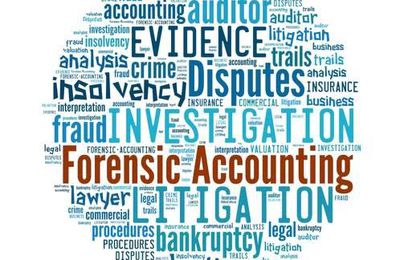
Forensic accounting is a combination of and investigative techniques used to discover financial crimes. One of the key functions of forensic accounting is to explain the nature of a financial crime to the courts. It is the assistance of finance professionals to settle disputes concerning allegations, fraudulence, suspicion of fraud and misconduct in business.
What does Forensic Accounting cover?
The two major aspects within forensic accounting practices are:
- Litigation support services: A forensic accounting expert measures the damages experienced by the parties implicated in legal disputes and can aid in settling conflicts, even before it reaches the courtroom.
- Investigative/fact-finding services: A forensic accountant must determine whether illegal matters such as employee felony, securities embezzlement (including tampering and distortion of financial accounts), identity theft and insurance racket have taken place.
Scope of forensic accounting
1. Look for evidence of unusual development in the accounting and financial systems.
2. Design accounting processes for verifying important premises and data. A forensic accounting orientation also calls for skills in identifying possible fraud.
3. Perform audit type processes on a routine schedule in order to reduce transaction processing risks.
4. Cover a broad range of businesses and locations that require customary or continuous surveillance of all transaction processing systems.
Forensic Accounting in India
The establishment of Serious Fraud Investigation Office (SFIO) in India has become the turning point for forensic accountants in the country. The indications of the growing demand for the field are:
– The growing list of online criminal offences.
– Breakdown of regulators to trace and detect cyber-security frauds.
– The long chain of co-operative banks going bust.
Types of Forensic Accounting
There are various types of forensic auditing :
- Financial theft (customers, employees, or outsiders)
- Securities fraud
- Bankruptcy : Bankruptcy is the legal status of a human or a non-human entity (a firm or a government agency) that is unable to repay its outstanding debts to creditors.
- Defaulting on debt
- Economic damages (various types of lawsuits to recover damages)
- M&A related lawsuits
- Tax evasion or fraud
- Corporate valuation disputes
- Professional negligence claims
- Money laundering
- Privacy information
- Divorce proceedings
Forensic Accounting Audit Procedures
- Investigation : Forensic accountants typically begin an investigation and collect evidence when fraud suspicions already exist. Because of this, the data they look for when conducting an investigation include red flags and discrepancies that might indicate fraud has taken place.
- Reporting : Once forensic accounting professionals gather information/data and develop a case, they present a summary of their findings to necessary personnel. Using this information, these workers determine how the fraud occurred and who played a role.
- Litigation : The final step of a forensic accountant’s process involves participation as an expert witness in the incident’s court case. The professional presents their findings as evidence in court and testifies against the offenders.

